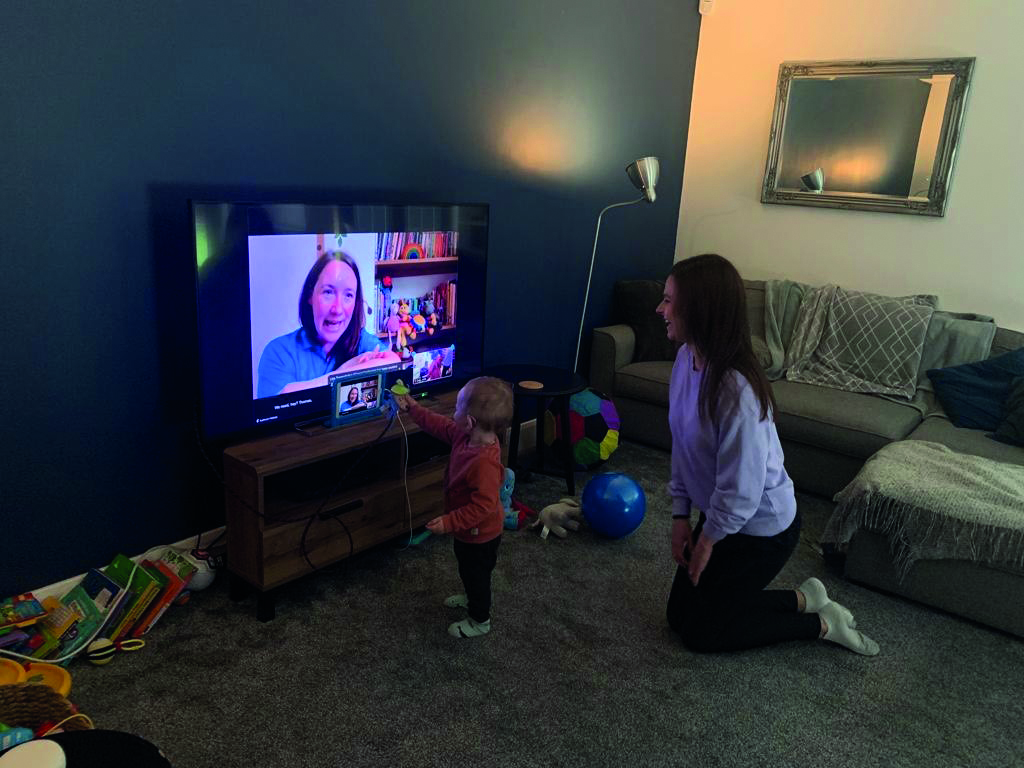
It happened at the end of the online Bounce Along to Baby Sign class. Session leader Kathryn Halsey asked if anyone had any questions. Zack, 16 months, ran up to the screen waving an Iggle Piggle toy – a character from television show In The Night Garden.
‘A sign for Iggle Piggle?! I had no idea. But with signing, you rely on the visual. Iggle Piggle waddles and carries a blanket,’ Halsey says, miming a waddle and slinging an invisible blanket over her shoulder. That became the sign and Zack's mother was delighted: ‘That's what we’ll use!’ she said.
The example illustrates what the National Deaf Children's Society (NDCS) sessions are all about: families having fun with their deaf child while learning communication tips relevant to their own lives. The charity runs about four sessions a month, each lasting 45 minutes to one hour, aimed at children aged from birth to four years. They take place online and are free for NDCS members.
Getting started
According to the charity, 90 per cent of deaf children are born to hearing families who have little or no background in deafness. ‘When you know that your child has a hearing loss, for a lot of people, your whole world just changes,’ says NDCS bright start development manager Faith Robyn. ‘Sometimes that can disrupt the attachment process because parents panic and worry: How deaf are they? Are they responding to me at all?’
The classes are an opportunity for parents and children to meet other families in the same situation, and grow confidence in using signs at home. Halsey begins each session with a ‘hello’ song, then moves onto a topic; for example, dinosaurs, emotions or going on holiday. She sings songs and reads stories, demonstrating signs for the children and families to learn along the way. NDCS tells families the theme in advance so they can bring props, such as shakers, books or food.
The session ends with bubbles, questions and goodbyes. ‘We always try to do food, play or a routine so they’re learning useful signs,’ says Halsey. ‘You need to know the sign for “change nappy” or “poo poo” or “bed” – the signs relevant for a two-year-old that you’re not going to learn on your level one British Sign Language (BSL).’
Gaining confidence
Doing the session online means the extended family can also take part. ‘Grandpa may join from Wales and mother and deaf baby from London,’ says Robyn. She adds that building children's confidence in their early years helps them develop a positive deaf identity when they are older. ‘If you’re deaf in the early years, and you have confidence and positivity in who you are, when you get to my age, you are so much more able to say: “Can you just repeat that for me?” Or: “That's not accessible for me.”’
Each session has an average of 15 participants, some of whom have returned several times since September 2021 when classes began. NDCS polled participants and found 98 per cent are using the signs at home. ‘It's breaking down those barriers that signing is something scary,’ says Halsey.
CASE STUDY: Jodie Gillard on her son Zack
 ‘When Zack failed his newborn hearing screening, hospital staff told us it was probably fluid in his ear. But aged three days old, an audiologist diagnosed him with permanent sensorineural deafness.
‘When Zack failed his newborn hearing screening, hospital staff told us it was probably fluid in his ear. But aged three days old, an audiologist diagnosed him with permanent sensorineural deafness.
‘Zack got hearing aids when he was three weeks old. His ears were growing so quickly we had to go to the audiologist every week to get new moulds. It was a lot to deal with on top of looking after a newborn as first-time parents.
‘Our hope is that Zack will be able to communicate verbally. But we heard about the signing sessions through the NDCS newsletter and realised signing will help him develop a deaf identity. Imagine if, when he's older, he makes deaf friends who are all signing, but he can't communicate with them.
‘This is the only baby group where we’ve met other deaf children. Doing the sessions at home is also better for Zack, as the acoustics in a church hall interfere with his hearing aids. Danny [his father] can also join in if he's working from home.
‘The other day he signed “out” when he wanted to get out of the bath. It's really encouraging that he can begin to communicate and not be frustrated.’
FURTHER INFORMATION
- The National Deaf Children's Society has a helpline: 0808 800 8880, www.ndcs.org.uk









